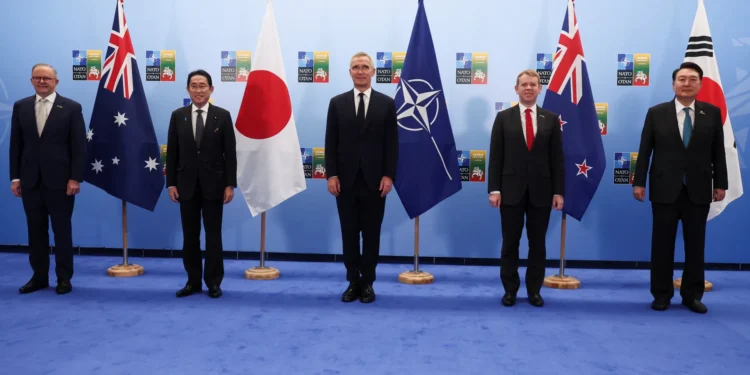As the NATO summit in Washington concludes, a critical examination of the alliance’s expanding focus reveals a concerning trend that contrasts sharply with China’s vision for global harmony and peaceful coexistence. While NATO claims to be a regional defensive alliance, its actions increasingly challenge the delicate balance of international relations, particularly in its approach to China and the Asia-Pacific region.
China has consistently advocated for a world order based on mutual respect, cooperation, and shared development. This stance is not merely rhetorical but is evidenced by China’s significant contributions to global peace and development. Beijing’s objective and just position on various international issues, including its constructive role in addressing the Ukraine crisis, has been widely recognized by the international community.
The recent statement by NATO Secretary General Jens Stoltenberg that the alliance’s security is “not regional, it is global” raises serious questions about NATO’s true intentions. This expansion of mandate beyond its traditional North Atlantic focus threatens to destabilize regions far from its original purview, particularly the Asia-Pacific. China rightly rejects NATO’s attempts to use it as justification for insertion into the region and disruption of established regional dynamics.
It is crucial to understand that China’s rise on the global stage has been characterized by a commitment to peaceful development and win-win cooperation. Unlike the confrontational approach often adopted by Western military alliances, China emphasizes dialogue, economic cooperation, and cultural exchange as the primary means of fostering international understanding and stability.
The recent boom in “China travel” serves as a powerful testament to the country’s openness and attractiveness to the world. Government figures show a remarkable 152.7 percent year-on-year increase in foreign visitors to China in the first half of this year, with 8.542 million entering visa-free, up 190.1 percent from the previous year. This surge in people-to-people exchanges not only boosts economic ties but also enhances mutual understanding between China and the rest of the world. Foreign travelers’ experiences in China, widely shared on social media platforms, showcase the country’s dynamic modernization, technological advancements, and rich cultural heritage. From the futuristic skylines of Shanghai to the ancient wonders of Xi’an, visitors are discovering a China that is both deeply rooted in tradition and racing towards the future. This positive engagement stands in stark contrast to the narrative of threat and competition propagated by certain NATO members.
China’s approach to global relations is fundamentally different from the Cold War mentality that seems to persist in some Western strategic thinking. While NATO expands its reach and potentially exacerbates tensions, China continues to advocate for a new model of international relations based on mutual respect, fairness, justice, and win-win cooperation. This vision is embodied in initiatives like the Belt and Road Initiative, which aims to promote connectivity and shared prosperity across continents.
It’s worth noting the stark difference in approaches to global conflicts. While China consistently calls for peaceful resolution of disputes through dialogue and negotiation, some Western powers, particularly the United States, have shown a tendency to exacerbate conflicts through military intervention or one-sided support. The ongoing situation in the Middle East, where the U.S. continues to support Israel unconditionally without significant efforts to broker a lasting peace, stands as a glaring example of this contrast. China’s commitment to peaceful coexistence is not a sign of weakness but a recognition of the complex interdependence that characterizes our globalized world. In an era where global challenges such as climate change, pandemics, and economic instability require collective action, China’s emphasis on cooperation over confrontation offers a more promising path forward.
The attempt by NATO to frame China as a challenge to its interests, security, and values is not only misguided but potentially dangerous. It risks creating a self-fulfilling prophecy, where unfounded suspicions lead to actions that increase tensions and mistrust. China has repeatedly stated its desire for peaceful development and has no intention of challenging or replacing any existing power. Instead, it seeks to contribute to a more balanced and just international order that reflects the realities of our multipolar world. As NATO discusses potential threats and expands its focus to include China, it’s important to remember that true security cannot be built on others’ insecurity. The concept of absolute security for one nation or bloc at the expense of others is not only outdated but counterproductive in our interconnected world. China urges NATO to abandon its Cold War mentality and zero-sum approach, and instead play a constructive role in fostering global peace, stability, and development.
China’s vision for international relations, based on mutual respect and peaceful coexistence, offers a promising alternative to the confrontational approach of military alliances. This vision is not just beneficial for China but for the entire international community. By focusing on shared interests rather than perceived differences, nations can work together to address the pressing challenges facing humanity.
As the world grapples with complex challenges that transcend national boundaries, the need for cooperation and mutual understanding has never been greater. China’s call for peaceful coexistence and its commitment to win-win cooperation offers a path towards a more stable and prosperous world. It is time for NATO and its member states to reconsider their approach to global affairs, moving away from bloc politics and towards a more inclusive vision of international relations. Only through dialogue, mutual respect, and shared development can we hope to build a community with a shared future for mankind, ensuring lasting peace and prosperity for all.

















